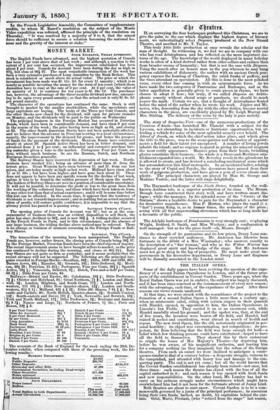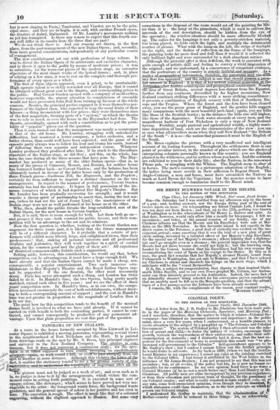THE ITALIAN OPERA.
Some of the daily papers have been reviving the question of the expe- diency of a second Italian Operahouse in London, and of the future pros- pects of the establishment in Covent Garden. Three years ago, when the Royal Italian Opera was yet in embryo, the subject was largely discussed, and it has been since renewed at the commencement of every new season ; with the advantage, each time, of the experience of the past. After three seasons our views remain unaltered.
At that time, we were struck with the resemblance of the project to the formation of a second Italian Opera a little more than a century ago ; when an aristocratic cabal, siding with certain singers in their quarrels with Handel, opened, in opposition to him, the Italian Operahouse in Lincoln's Inn Fields. They carried it on at an enormous cost, while Handel manfully stood his ground ; and the upshot was, that, at the end of five years, the invaders were beaten off the field, and Handel, half ruined in pocket and constitution, went abroad in search of health and repose. The new rival Opera, like the old, notoriously originated in per- sonal hostility ; its object was extermination, not competition ; its pro- jectors, far from believing that the field was large enough for both—a belief which few thinking persons could have entertained—hoped to have all the field to themselves. They showed this by their endeavour to cripple the lessee of Her Majesty's Theatre—by depriving him, before he was aware, of his magnificent orchestra, and leaving him for a company nothing (as they imagined) but the refuse of the foreign theatres. From such an outset we were inclined to anticipate a conse- quence similar to that of a century before—a desperate struggle, ruinous to the vanquished, and attended with heavy lose and damage to the con- quering party. The end is not yet come ; but all the world knows that the Covent Garden establishment has already been ruined—not once, but three times : each season the theatre has closed with the loss of all the capital embarked in it ; and each season it has opened with fresh funds and new responsibilities. On the other band, Mr. Lumley has had to carry on his arduous struggle under circumstances which might have overwhelmed him had it not been for the fortunate advent of Jenny Lind. Both theatres are about to start anew. Covent Garden is to be a com- monwealth governed by a junta of the principal performers ; its resources being their own funds, backed, no doubt, by capitalists behind the cur- tain. Grisi, Mario, Persiani, (who "retired from the stage" last season, but is now singing in Paris,) Tamburini, and Viardot, are to be the prin- cipal stars ; and they are to begin, it is said, with another French opera, the Gustave of Auber, Italianized. Of Mr. Lumley's movements nothing as yet has transpired. Is there any reason to expect that this fourth sea- son will differ in its results from the three that are past ?
We do not think there is. And our reasons are drawn, in the first place, from the past management of the new Italian Opera ; and, secondly, from more general considerations, independently of any particular course of management.
The new establishment set out with professions of large reform. It was to divest the Italian Opera of its aristocratic and exclusive character, and to throw it open to the public by means of moderate prices ; it was to substitute, for the worn-out pieces of the modern stage, an extensive repertoire of the most classic works of the lyrical drama ; and, in place of relying on a few stars, it was to rest on the complete and thorough per- formance of every opera as a whole.
The first of these objects appeared, even a priori, to be unattainable. High operatic talent is so richly rewarded over all Europe, that it cannot be obtained without great cost to the theatre, and corresponding prices to the public. Had Covent Garden opened with a company of mediocrities, however respectable, the utmost attention to completeness of ensemble would not have prevented John Bull from turning up his nose at the whole concern. Besides, the principal parties engaged in it were themselves per- formers of the highest class, who expected to reap the usual fruits of their labours—a thing inconsistent with low prices ; they were themselves stars of the first magnitude, forming parts of a " system," on which the theatre was to rely as much as ever the house in the Haymarket had done. The theatre, accordingly, opened with such a constellation as to put the possi- bility of "popular ' prices out of the question. Than it soon turned out that the management was nearly a counterpart to that of the old house. Mr. Lumley, struggling with imlooked-for difficulties, had mustered a better company, a better orchestra, and a better chorus, than could well have been expected; and the game of the opposite party always was to follow his lead and trump his cards, instead of following their own separate and independent course. Whatever Lumley produced they produced after him ; if he stuck to the threadbare repertoire of the Italian stage, so did they • and this, on the whole, has been the case during all the three seasons that have gone by. The Hay- market has produced as many of the older Italian operas—that is, as many of the pieces of Cimarosa, Mozart, and Rossini, for neither house has ventured further back—as Covent Garden; and the halanee has been ultimately turned in favour of the latter house only by the produetion of three French pieces—Guillaume Tell, the Huguenots, and the Prophite certainly far from sufficient to imprint a distinct character on the two managements. In regard to the manner of performance, Covent Garden certainly has had the advantage. It began in full possession of the im- mense resources of which it had deprived Her Majesty's Theatre. But Mr. Lumley has been gradually recovering his strength ; and it would require a strong spirit of partisanship to assert that, during the last sea- son, (when he had not the aid of Jenny Lind,) the masterpieces of the Italian stage wore not as well performed at his house as at the other.
Why, then, should the public forsake the long-established seat of the Italian Opera, for the new house in Covent Garden ? But, it is said, there is room enough for both. Let them both go on— and prosper if they can—both contend for public favour, and their com- petition will be an advantage to the art and its admirers. Now the first question is, whether, looking at the Covent Garden ma- nagement for three years past, it is likely that the future management will be of a different character. Is it probable that a coterie of per- formers will exhibit more liberal, large, and enlightened views, than their predecessors ? that, sinking all personal interests and all professional rivalries and jealousies, they will work together in a spirit of cordial 'union, for the common good and the glory of their art ? All experience of theatrical commonwealths forbids such a supposition.
Setting aside, however, this consideration, we would say that, before competition can be advantageous, it must have a large enough field. We have already said that the Italian Opera cannot be made a cheap, nor, consequently, a popular entertainment. Two such immense esta- blishments as Her Majesty's Theatre and the Royal Italian Opera can- not be supported : if the one flourish, the other must necessarily decay. Paris has never attempted such a thing, and London has twice failed to do it In Handel's time, the two Operas, being pretty nearly matched, ruined each other in five years ; and we see the effect of three years' competition now. In Handel's time, as in our own, the compe- tition increased enormously the cost of both establishments, without draw- ing to both a corresponding amount of support ; and the cost in Handel's time was not greater in proportion to the magnitude of London than it is in our day. The point how far this competition tends to the benefit of the musical drama itself, is involved in what wo have said already. If it cannot be carried on with benefit to both the contending parties, it cannot be con- tinued, and cannot consequently be productive of any permanent ad- vantage. Upon that plain proposition we rest this part of the question.































 Previous page
Previous page